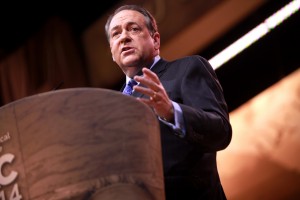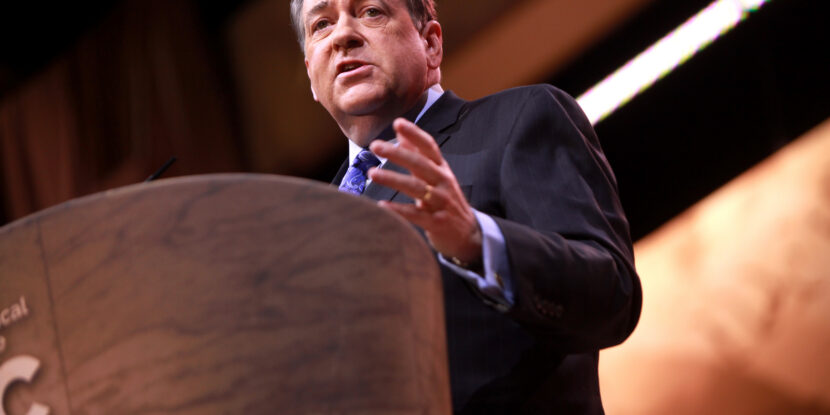
Over at the National Journal, Josh Kraushaar makes the case against smartypants politically dismissing Mike Huckabee in a column tellingly called “Mike Huckabee’s Message is as Formidable as Jeb Bush’s Money”.
Kraushaar’s point: While other GOP candidates repeat well-rehearsed talking points about regulation, taxes, and energy, Huckabee is looking for ways to distinguish himself from the pack by a distinctively populist-sounding economic message. First, he is pointedly taking Social Security privatization and/or a reduction of benefits for retirees off the table. “If Congress wants to take away someone’s retirement, let them end their own Congressional pensions—not your Social Security,” as Huckabee said during his announcement speech. He has since defended this view elsewhere:
“I’m thinking, wait a minute, didn’t the government take that out of my check for all these years involuntarily?” Huckabee said. “But why would you punish the recipients who played by the rules that they were forced to play by?”
Secondly, as Kraushaar notes, “He slammed free trade agreements for reducing the cost of wages, saying he’d ‘like to think the U.S. government would stand up for the U.S. workers rather than let them take it in the backside.’”
Huckabee is politically smart to look for ways to distinguish himself in a crowded field, and he is also right that both the morally and politically correct response to our extended economic crisis hurting average workers is a populist economic message. The Democrats are increasingly driving working class whites into the GOP coalition, and it makes sense that someone would attempt to rise to lead this faction (Rick Santorum is also competing for this space). But it is more important that that economic message be true—that electing a GOP candidate for president would actually recreate a vibrant growing economy that benefited working families generally—and here being anti-free trade is going to hurt, not help.
You can see other candidates struggling with the reality that Romney’s economic message did not connect with voters, as we were the first to point out. Both Scott Walker and Marco Rubio are trying to do it primarily through their biographies, not their policies, in order to take the same message and put a middle class face on it.
But what nobody is doing, including Huckabee, is explaining in a very clearly why the great American economic engine has suddenly ground to a halt. Why are wages stagnating? Why is the middle class standard of living going down?
The biggest problem we face is the attempt to transform America’s great free market system into a banana republic crony capitalism, with the Federal Reserve a key player. Rubio may say the problem is not Wall Street but K Street, but in truth the corrupt alliance between K Street and Wall Street banks is a huge part of our problem.
Our debt, as Steve Wynn points out, is eating away at workers’ paychecks as much as Obamacare is. The “stimulus” did not stimulate because the money did not go into investing in the real economy. The credit of small businesses was practically frozen, and large corporation hugged cash in response to the shortfall of investment and credit and the strange new threats of government regulation used to squeeze campaign cash out of companies.
In his forthcoming essay “The 21st Century Case for Gold: A New Information Theory of Money,” the great George Gilder points to two great causes for the shrinkage of invention and investment that drives economic growth and wage growth: the government’s vain attempt to create economic growth by manipulating money and the “outsider trading scandal” in which SEC regulations and Dodd-Frank that are portrayed to voters as necessary to restrain banks are instead used to punish and threaten investors who attempt to make investments based on deep knowledge of companies.
Gilder writes:
Dwarfing all positive investment by . . . knowledge brokers are the financial power brokers in major banks. . . They have long had access to virtually unlimited funds at near zero interest rates and have been annointed as too-big-to-fail by government. In effect the federal government through the Federal Reserve Bank and scores of other regulators has socialized the downside of these institutions. . . .from 2000 to 2010, the socialized big banks feasted on zero-interest-rate money from the fed, bought a total of many trillions of dollars worth of government bonds, and harvested the spread. From the Fed, they received over a trillion dollars of surreptitious largesse. For their services to the government amid a failing economy, they paid themselves salaries and bonuses estimate to total $5 trillion, or one third of an entire year of national GDP.
These gains for bankers and governments were defrayed by the taxpayers and shareholders and even retirees through the zero interest rate policy (ZIRP). When something is free only the well connected get much of it. Main Street is far back in the queue. Zero interest rates results in easy money for high-leveraged Wall Street speculators, cheap money for the government, and parched credit for entrepreneurial small businesses that generate nearly all new jobs and learning.
And learning, Gilder points out, is not just a pathway to wealth, it is what wealth is. Matter is conserved. The Neanderthals had all the same material resources we have. Our wealth consists in unleashing the power of human enterprise to take risks, to learn from failure as well as success, and to reap the benefit.
When regulations are vague enough, crony capitalism flourishes: even vague threats to investors’ livelihoods lead them to grant protection money to politicians and to avoid attracting the ire of politically driven regulators.
(If you want to know why big corporations are now publicly denouncing religious liberty in America, look to crony capitalism for a big part of the explanation—it’s a cost-free way to win brownie points with the White House.)
My great fear is that Huckabee will win, and, if he does not have a more profound economic message, sink the GOP brand by failing to revive the economy.
Crony capitalism is fake capitalism. Like most other politically-driven economic systems it delivers its benefits primarily to the rich and well connected. The voters who feel the game is being rigged are not wrong. We need to find a better vocabulary for saying so and one that points to a way to make economic growth and middle class opportunity happen once again.
Maggie Gallagher is a senior fellow at American Principles in Action.


